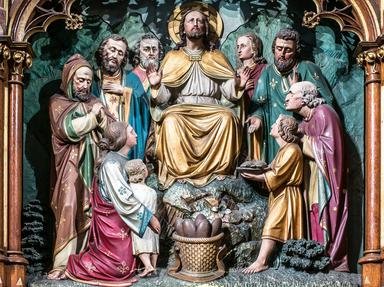Quiz Answer Key and Fun Facts
1. The first case and mystery to solve:
Murder most foul indeed. Or so the ghost told Hamlet and me. But I digress from the issue at hand in this place known as dead man's land. Of the four people listed below whom had their lives ended by Joab, which one did NOT die directly by Joab's hand? (Think David's sin.)
2. The second case:
Another terrible crime in another place and time. A rape and vengeance leads to blood in the streets. Which sister had two brothers who killed the offender and all his kin? (Maybe she was in the kitchen all the live long day?)
3. The third case:
Sold into slavery and then falsely imprisoned, can things get any worse? Well I rose to the second highest position in the kingdom from such disastrous beginnings. Who am I?
4. The fourth case:
To be or not to be, that is the question or is it? Most everyone knows who left this earth in a chariot of fire, but who witnessed this miraculous event?
5. The fifth case:
Graffiti in the Old Testament? You bet. A disembodied hand, or was it a lion's paw, wrote a message to a king on the wall. Which Old Testament prophet was called in to interpret the writing?
6. The sixth case:
You reap what you sow or so the saying goes. Which queen of Israel killed an innocent man for his vineyard? For this it was prophesied the dogs would eat her when she died.
7. The seventh case:
Plots go awry as Iago can testify. Which enemy of the Jews sought their annihilation only to die upon his own gallows? Your choice here is between three names: either Haman, Naaman, or Teman.
8. The eighth case:
A foreigner sought a cure from an Israelite prophet but was angered when the prophet would not address him directly. Still he was convinced by his slaves to do as the prophet said and was healed. Your choice here is between three names: either Haman, Naaman, or Teman.
9. The ninth case:
"'Cry havoc!', and let slip the dog's of war." During the reign of King David he had a group of warriors famous for their exploits. What was the name of this group in the King James Version?
10. The tenth case:
In Abraham's Bosom unbound by time, I heard tell of a victory in Michmash during the early days of the kingdom of Israel that was repeated 3000 years later during World War I. This victory belonged to which man about whom it was said, "How the mighty have fallen", upon his death years later?
Source: Author
tazman6619
This quiz was reviewed by FunTrivia editor
CellarDoor before going online.
Any errors found in FunTrivia content are routinely corrected through our feedback system.

